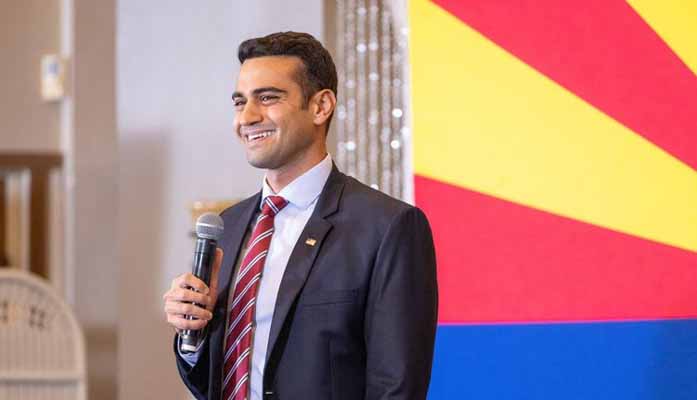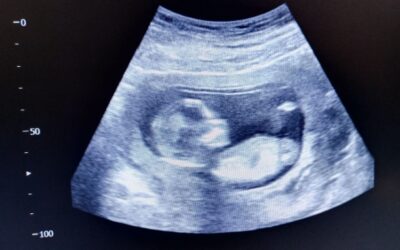By Corinne Murdock |
Abe Hamadeh argued for a new trial on Tuesday before the Mohave County Superior Court.
The judge, Lee Jantzen, seemed interested in sampling the evidence presented by Hamadeh’s team in the case, Boyd v. Mayes, despite multiple objections from opposition. Arguments presented by the opposition — the attorney general, secretary of state, and Maricopa and Pima counties — mainly focused on the amount of time that’s transpired since the election and Hamadeh’s December trial. Arguments presented by Hamadeh’s team focused on evidence of allegedly disenfranchised voters, claiming that hundreds of “lost” (uncounted) votes from undervotes and provisional ballots proved that Hamadeh won the race.
Lawyers present for the oral arguments included former assistant attorney general Jen Wright, State Rep. Alex Kolodin (R-LD03), and James Sabalos for Hamadeh; Alexis Danneman and Paul Eckstein for Attorney General Kris Mayes; Craig Morgan for Secretary of State Adrian Fontes; Daniel Jurkowitz for Pima County; and Joseph La Rue for Maricopa County.
Sabalos opened up the oral arguments, quoting Thomas Jefferson and summarizing general discoveries in the course of their months-long review of voter data as a precursor to Wright’s arguments.
“We do not have a government by the majority; we have a government by the majority who vote,” quoted Sabalos.
Sabalos insisted their case wasn’t about fraud, but about the evidence and facts supporting the reality of Hamadeh as the winner of last November’s election contest. He claimed that Gov. Katie Hobbs, in her former capacity as secretary of state, was aware of and neglected to immediately publicize 63 Pinal County undervotes that lent to Hamadeh’s claims last December of lost votes.
Sabalos said this intentional concealment of facts served to handicap their team’s due diligence of reviewing election data for the courts. Sabalos further claimed that there were 76,339 votes counted as undervotes in the attorney general’s contest. Of the approximately 2,000 ballots they inspected, 14 were misread (.61 percent). With that percentage applied to the larger total of undervotes statewide, Sabalos said that amounted to 466 or more votes — more than the 288-vote lead Mayes holds over Hamadeh.
Sabalos then claimed that there were uncounted provisional ballots that constituted legal votes, and that the majority of those would’ve turned in favor of Hamadeh.
“We don’t come today with hyperbole or speculation. We come with some reasonably solid evidence, and we need a heck of a lot more for this judge and this court to get its hands around,” said Sabalos.
Wright followed up Sabalos’ arguments by first focusing on Hobbs. She said that Hobbs didn’t fulfill her duty of being a neutral, nominal party, since Hobbs argued heavily that Hamadeh had no evidence to support his claims, while allegedly knowing of the dozens of undervotes recovered during the recount, and pushed for his case to be dismissed. Wright further noted that Maricopa County Elections Director Scott Jarrett admitted during the December trial that he wasn’t sure why certain votes weren’t counted, and instead counted as undervotes.
Wright expanded on Sabalos’ claim of the 63 undervotes, noting that they were counted as valid during the recount. Wright asserted that Hobbs knew of this fact, which she said rendered Hamadeh’s claims during the December trial valid. Wright also dismissed Hobbs’ claim that she was under an order preventing her from disclosing the undervotes, since the order only applied to counties discussing the recount results from vote totals. Wright claimed that the judge would’ve permitted Hamadeh a review of the evidence had Hobbs been forthright all those months ago.
“I find it questionable that a government agent would take support of or opposition to a candidate in an election contest,” said Wright.
Wright further noted that Hamadeh was unable to obtain the provisional ballot data from Maricopa County until days after the trial occurred, further hindering his ability to meet statutory deadlines.
When Wright attempted to discuss the evidentiary numbers on undervotes, both Mayes and Fontes’ legal teams raised objections. The judge overruled their objections, however.
Wright claimed that their team interviewed hundreds of high-propensity voters affected by statewide computer system changes, which allegedly altered their registration address without their consent and therefore deprived them of the right to vote. She claimed that over 1,100 Election Day provisional voters were disenfranchised.
Election Day votes went overwhelmingly for Hamadeh: over 69 percent to nearly 29 percent for Mayes. Wright said that this would mean about 760 of provisional ballots would be for Hamadeh, and 316 for Mayes. By Wright’s math, Hamadeh would prevail on the provisional ballot issue alone by 165 votes.
Wright further noted that their team had collected sworn affidavits of hundreds of voters claiming disenfranchisement due to bureaucratic failures. When she attempted to read the account of one allegedly disenfranchised voter, Mayes’ team raised an objection. The judge promptly overruled.
The allegedly disenfranchised Maricopa County voter, Marlena, attempted to vote on Election Day but was denied. Marlena had reportedly experienced issues with the county’s registration system for months: earlier that year, she discovered that her registration had changed without her knowledge and consent. Wright presented evidence that on October 10, 2022, Marlena attempted to correct her voter registration before the deadline. Wright also presented evidence from Maricopa County confirming Marlena’s registration. Yet, she was denied on Election Day.
Danneman, Mayes’ lawyer, said Hamadeh’s claims were speculative and based on unsworn opinions. She emphasized repeatedly the timeliness of his contest, noting that it has been over five months since the December trial and that their team could only present an argument that they needed more time to look for votes.
Danneman further rejected the argument that Hamadeh should be granted a new trial to undertake further investigation. She said that evidence must be material, in existence at the time of trial, and not be discovered with reasonable diligence.
She added that Hamadeh’s request for a more complete ballot inspection proved there wasn’t any newly-discovered evidence warranting a new trial.
The provisional voters list didn’t hold much weight in Danneman’s view. She claimed Hamadeh was undertaking a “fishing expedition” for evidence, which she pointed out was prohibited by court precedent.
“This list of names proves nothing,” said Danneman. “The plaintiffs had their day in court.”
Morgan, with Fontes, added that it was “long past time” for this election contest to end. He said that Hamadeh’s challenge impugns the validity of election processes as well as the integrity of election officials.
La Rue with Maricopa County concurred. Jurkowitz with Pima County argued further that statute time bars any further contest.
Following the hearing, Hamadeh expressed optimism that the oral arguments ultimately were in his favor.
The judge promised to issue a ruling within the next couple of weeks.
Watch the full hearing here:
Corinne Murdock is a reporter for AZ Free News. Follow her latest on Twitter, or email tips to corinne@azfreenews.com.








